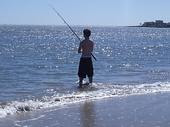Midafternoon.
Her canyon. Her house
a carriage house kind of,
set back
with a lot of glass
and wood stained red.
Tea brews
and the scent of Lapsang spins
from the open door with Leonard Cohen's
first album, the perfect
scent and voice
for any good year in the sixties.
She places chairs erratically
around the grass yard
and a few of us
sit down to discuss
the daily news,
a new generation
of drugs. Sunday afternoon.
She's a woman
whose boyfriends become best friends.
She still wears a dark kimono,
her hair flat black held
in a brightly colored lanyard.
She serves up wan vegetable cakes
and pale cookies from Canyon
Health. The sun
Won't budge, just
another extended afternoon:
too much light. Too much time.
Too much talk waiting
for the sun to move on.
Too much water coursing
under the bridge, too many streams.
Heat from the Valley washing over us.
The tea we sip frosts our shades.
The speaker's voice throughout this poem is soft but not very structured at all. The speakers voice seems to rapidly skip from idea to idea as if life was passing by his quickly. At the beginning, the poem is made up of very short lines but then the lines become longer as the poem nears it's ending. A new line seems to start when a new idea or snese is brought up. The voice is very calm and observant as a result of the observation of this life that the speaker is living.
Saturday, October 18, 2008
Subscribe to:
Post Comments (Atom)

1 comment:
"The speakers voice seems to rapidly skip from idea to idea as if life was passing by his quickly."
Good point. I agree with this idea because the lines of the poem are randomly thrown in without a pattern or a sense of order. For example:
Health. The sun
Won't budge, just
another extended afternoon:
These three lines contain the end of a sentence (Health), the beginning of another (The sun), an interruption (the space between lines), and the promise of another idea (the colon). The poet, Daniel Halpern, uses the lines of the poem, the style of the sentences, and the choice of words in the poem to convey the personality of the woman. Halpern says that she "places chairs erratically around the grass yard". Halpern does the same with the lines of the poem, which reflects her behavior.
Post a Comment